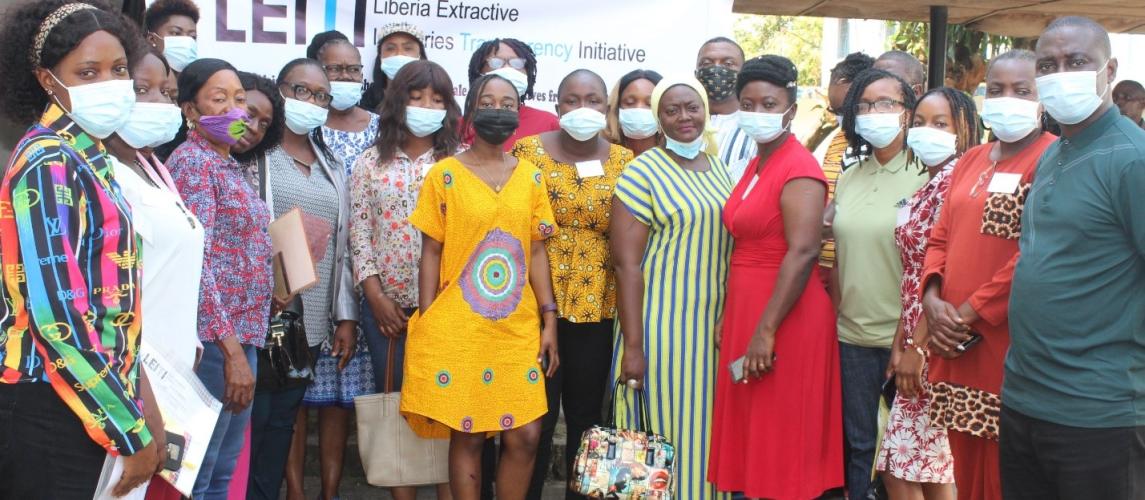
LEITI Empowers Women Stakeholders for Better Natural Resource Governance
More than twenty five women beneficiaries at a one day training on gender mainstreaming are calling for practical actions for women empowerment and participation in Liberia’s natural resource sector.
At a one day workshop on gender mainstreaming organized by the Liberia Extractive Industries Transparency Initiative (LEITI), the women drawn from key civil society organizations, the private sector and line government ministries and agencies collectively noted that while there are existing laws that guarantee women rights and participation in especially the management of natural resources, there are no practical steps taken by men to ensure their full participation.
“
Women bear the brunt of concessions and should be key players in the signing of these agreements” says Madam Teresa Viskinda, President of the Liberia Labor Congress. “It is time we push our male counterparts to adhere to the laws to see us as equal partners in decision making concerning our resources; it is my expectation that women voices will be strengthened in the natural resource sector of this country after this training.” She furthered.
“Women issues are serious issues and so society should be keen on them, we need more education on how concessions are signed and the roles women play should be conspicuously cleared because the more education women receive, the better the society.” Mrs. Cerue Garlo, Senior Gender Specialist at the Carter Center Liberia and lead facilitator, noted.
Madam Garlo admonished her colleagues to work together if they are to achieve their goal: “This meeting is intended to give stronger voices to women in the national resource governance sector and hence, we must take actions such as reviewing the laws and policies to reflect our collective desire for change.” She stressed
For his part, the Chairman of Liberia’s Multi-stakeholder Steering Group, C. Mike Doryen promised to work with the women stakeholders to garner the necessary measure to ensure women get their just recognition and impact in the natural resource management of Liberia. “One of the ways for us to end marginalization against women is providing education, let’s look at the laws and policies and see how we can empower our women so that they can influence things in the society.” He admonished.
Earlier, the Head of Secretariat, Jeffrey N. Yates disclosed that at the LEITI, gender mainstreaming is a new phenomenon especially in the natural resource management setting but that the Secretariat stands ready to work with the women to elevate their issues and amplify their voices on issues surrounding the management of the natural resources: “We have not make significant progress towards this issue but we need to work together to accelerate the little gains. We will stand with you.”
The workshop was aimed at encouraging participants and stakeholders to reflect on their current attitudes and perceptions of gender, decision making and Natural Resource Management, and explore new paradigms of practice. It also aimed to create space for women and men to work together to achieve sustainable Natural Resource Management in Liberia and was held under the topic: Importance of gender equality, mainstreaming and social inclusion in the natural resource governance of Liberia. The gathering identify the patriarchal nature of the Liberian society as a challenge to gender inclusiveness especially in rural Liberia.
At the end of the workshop, the women outlined several recommendations to the LEITI that would enhance their adequate participation in the sector of which popularization of the existing guidelines on how concessions are made, the revision of existing laws and regulations on gender as well as the establishment of a gender policy and unit for the LEITI are key.
Gender inequalities can be exacerbated when women are excluded from natural resource management or face barriers to their full and equal participation. Decision-making process in the governance and management of the extractive sector must be inclusive; to ensure that the views of women and the most vulnerable and marginalized members of communities impacted by the sector are taken into account.
Requirement 7.1 sections two (II) and three (III) of the 2019 EITI Standard encourage implementing countries including Liberia to mainstream gender in their local implementation activities especially reporting and dissemination.
